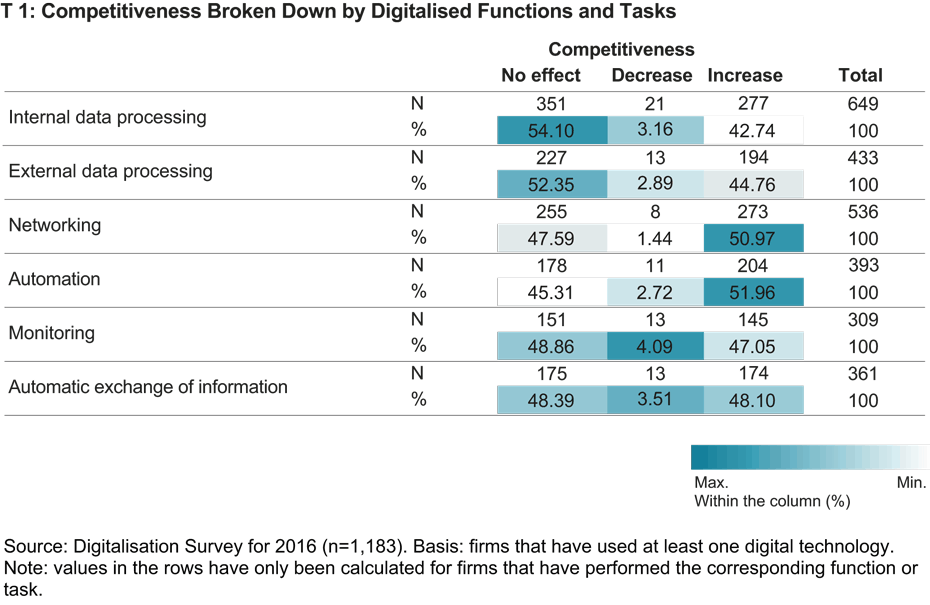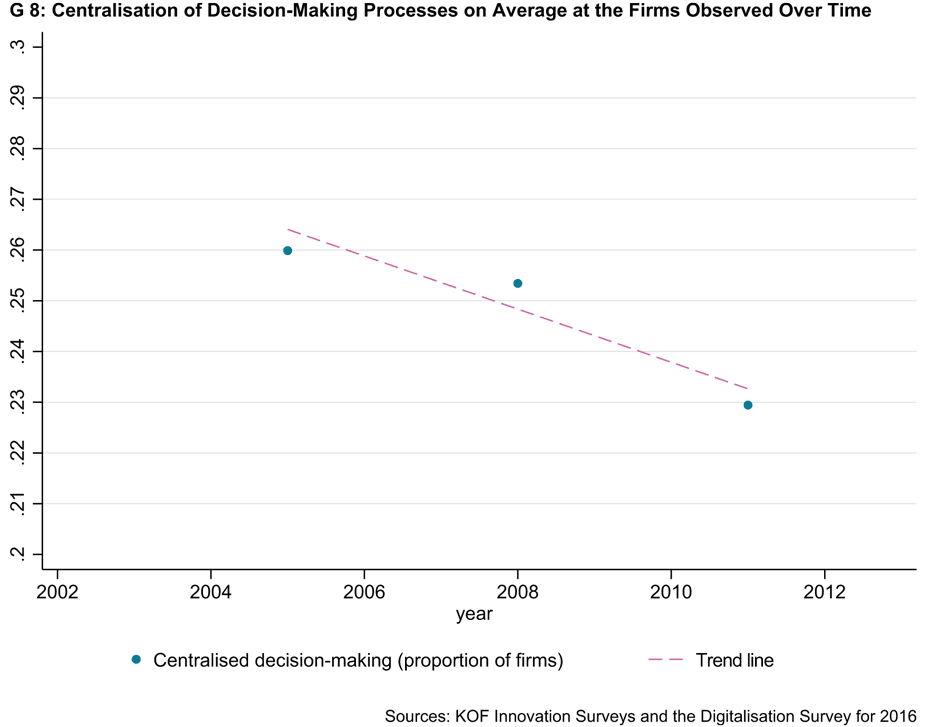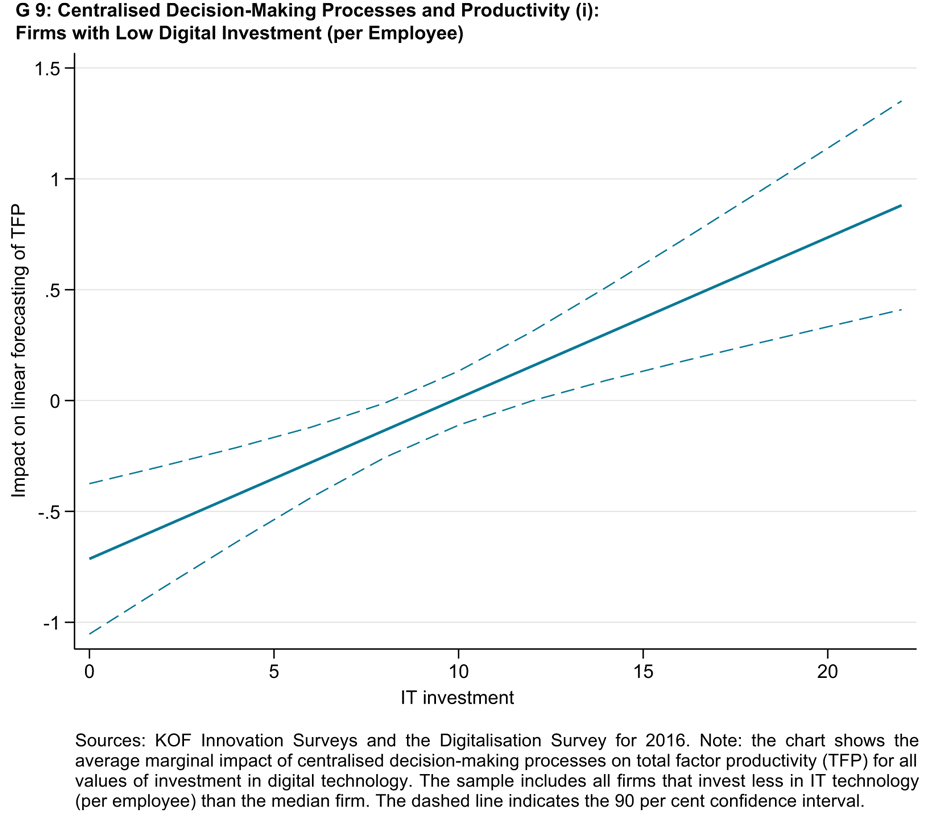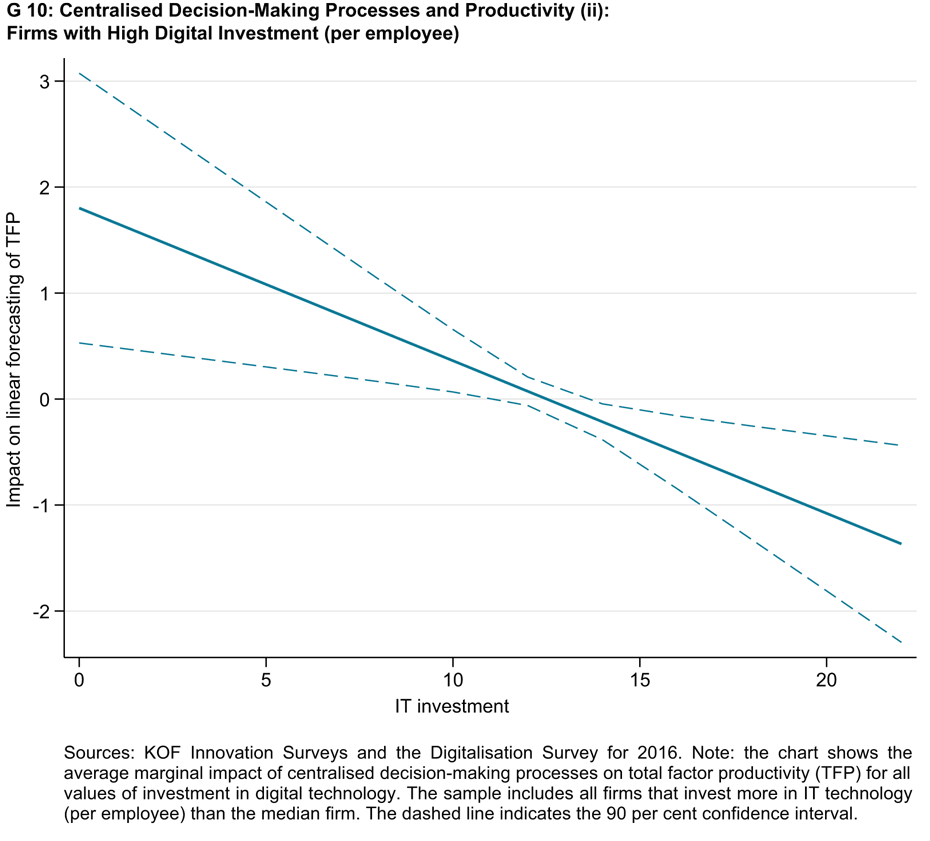Digital investment pays off – but only if companies change their organisational structures
- Innovation
- KOF Bulletin
Although more and more firms are recognising the benefits of digitalisation and are therefore investing in the corresponding technologies, this approach does not necessarily yield productivity gains. A new study by KOF shows how companies can improve their competitiveness by modifying their organisational structures and investing in information technology (IT).

Nobel laureate Robert M. Solow recognised back in 1987 that spending on IT does not directly impact on the competitiveness of a business. He noticed that the personal computers only recently introduced at that time did not seem to have any effect on measures of productivity. This phenomenon is called the 'Solow Paradox'.
A recent KOF study commissioned by the Swiss Foundation for Research and Education Quality (SFAQ) and the Swiss Association for Quality and Management Systems (SQS) in collaboration with the Chair of Production and Operations Management (POM) at ETH Zurich looks at digitalisation in the Swiss economy. The channels through which competitiveness can be increased by digitalisation are examined in more detail. The study analysed data from the KOF Innovation Survey from 2002 to 2016 and the Digitalisation Survey for 2016. These survey data are based on the KOF Enterprise Panel, which consists of 6,500 companies (stratified random sample) and is representative of the Swiss economy.
The descriptive analysis conducted as part of the study shows, first of all, that firms which digitalise their functions and tasks often increase their productivity. According to Table 1, this applies in particular to companies that use digital technology to network information and automate processes. However, the integration of such technological innovations into day-to-day operations also requires an organisational transformation process. In addition to a pronounced ability to innovate (article) and possessing the latest IT security (article), the study identifies a company’s organisational structures as another key factor in increasing productivity through IT investment.

Swiss firms are becoming increasingly decentralised
The econometric model in the KOF study uses two variables to classify the organisation of a company’s operations. One indicator is calculated for the flexibility of working hours and another for the centralisation of decision-making processes.
The degree of working-time flexibility in a company is measured by the importance of part-time and temporary employment as well as variable annual working hours. A binary variable is formed from this information, which takes on the value 1 if the working hours in a firm can be divided up flexibly to a large extent.
The second indicator – centralisation of decision-making processes – is constructed by asking about the responsibilities and decision-making powers exercised by supervisors and workers in different situations. These include, for example, customer contact, setting the pace of work, and problem solving in a company. A binary variable is again constructed. A value of 1 here means that the degree of centralisation in a firm is above the 75th distribution percentile. A value of 0 indicates that a company has a fairly decentralised structure. Chart 8 shows the progression over time of the proportion of firms surveyed that have attained a value of 1, i.e. have a high degree of centralisation. The measured share is apparently steadily decreasing. This means that firms are increasingly handing over decision-making powers to their employees.
This trend is also visible in the KOF study’s anecdotal example of a Swiss insurance company, where representatives from different work areas are increasingly involved in decision-making in order to drive digitalisation forward according to the 'bottom-up' principle. In addition, flexible incentive systems have been introduced to inspire employees to embrace the changes in corporate culture.

A coherently organised business can increase the productivity gains yielded by digital investment
In order to reap the benefits of investing in digital technology, certain conditions – such as the IT security mentioned above – must be met.
Highly centralised decision-making powers can enable digital investment to boost competitiveness. Companies that invest relatively little in IT per employee raise their productivity when decisions are made centrally. This correlation is clearly shown in chart 9. However, this finding is not universally applicable: the opposite is true of firms that invest significantly in digital technology per employee. In such cases, decentralised decision-making encourages the productive use of digital investment, as can be seen in chart 10. The flexible organisation of working hours, on the other hand, does not yield any additional effect if a firm’s organisational structures remain unchanged.
If a company wants to increase its competitiveness by investing in IT, it must modify its organisational structures and, above all, its decision-making processes. Another example in the KOF study illustrates what successful transformation of a firm’s organisational structures can look like. A Swiss family-run business, which operates as a supplier to the construction and automotive industries, has already invested heavily in digitalisation and, in order to reap the benefits of this approach, has modified its organisational structures accordingly. It fosters an open culture of cooperation, for example, by having flatter organisational hierarchies and a platform for data and information exchange. The firm reckons that its chosen path has paid off.


Contact
KOF FB Innovationsökonomik
Leonhardstrasse 21
8092
Zürich
Switzerland
KOF Konjunkturforschungsstelle
Leonhardstrasse 21
8092
Zürich
Switzerland